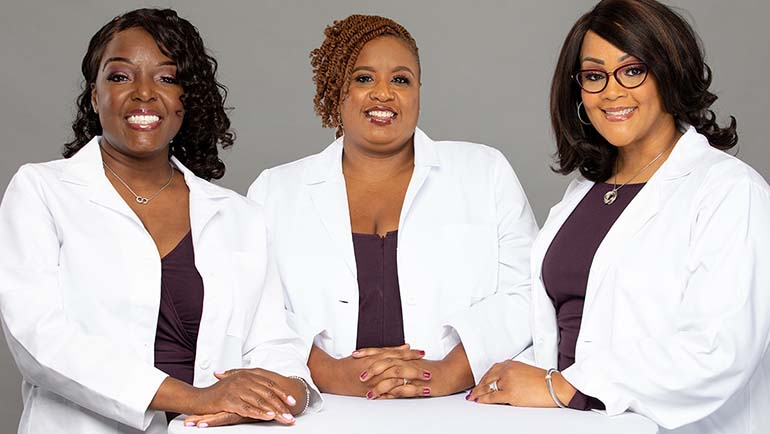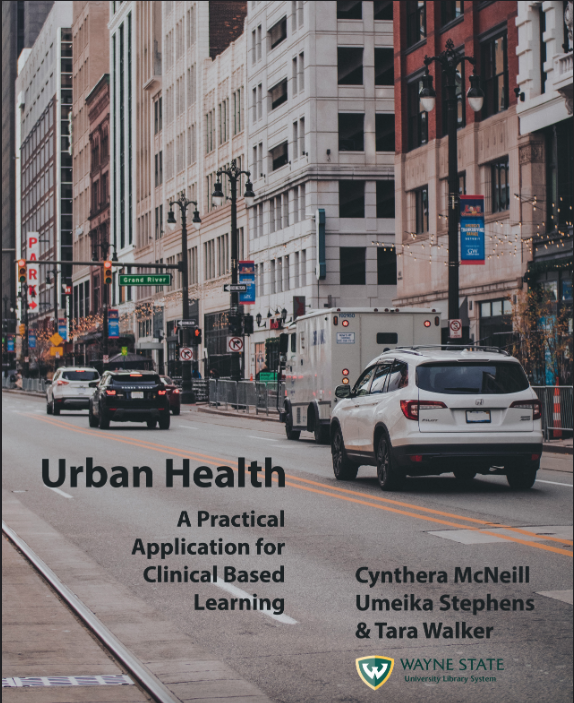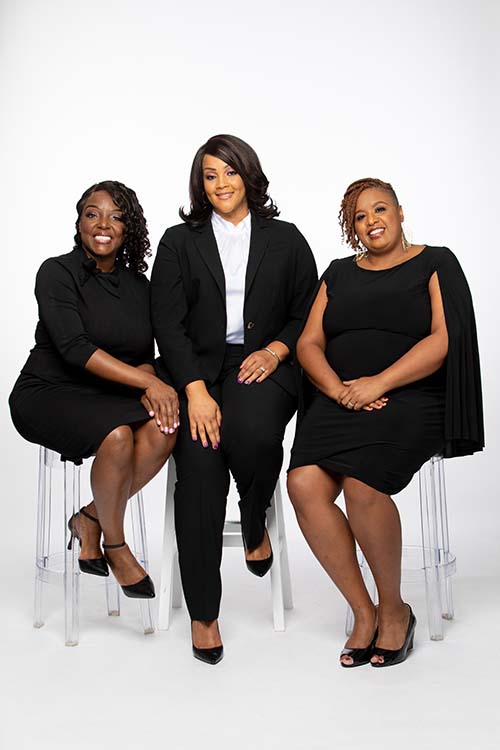
For more than a decade, Wayne State University nursing professors Cynthera McNeill, Tara Walker and Umeika Stephens heard the grim predictions, stark warnings and dire research findings that define the racial health gap in America. Year after year, they listened as colleagues spun disheartening tales of just how poorly African Americans, particularly in big cities, fare in nearly every major health category as compared to other groups.
But the conversations about these problems were always missing something, they said — namely, answers.
“We found that there would be a gap not only in practice, but also a gap in the literature,” said McNeill, who, along with Walker and Stephens, earned her doctorate in nursing from the WSU College of Nursing in 2013. “Most of the time when you read about urban health, it's about data. It's about statistics of disparity. It doesn't really talk about the lived experience. It doesn't tell people how to really engage and build that patient/provider relationship.”

Flash forward nearly 13 years and not only have the three DNPs spent their professional lives grappling with Black and urban health crises, but the trio also has, literally, written the book on addressing these problems.
Published in November 2022, Urban Health: A Practical Application for Clinical Based Learning is fast becoming a respected and authoritative text on the nation’s racial health gap and, perhaps more importantly, on how to narrow it. The free, open-access textbook — composed of seven meaty chapters and an appendix featuring key stats — has been downloaded hundreds of times since its release and has found its way into the hands of researchers, professors and students not only in metro Detroit but in nearly every state and even around the world.
Whether advising on exercise, diet or other health issues facing Black Americans, Urban Health is turning into a must-read for many.
“We've been surprised that interest in the book hasn't just been urban areas,” said Stephens, who, like McNeill, hails from Detroit. “It has been downloaded internationally even. We got one of our first reviews, and we were all very surprised at how stellar the review was. The book has been everywhere. It has been primarily urban areas, but we've also hit almost every state and gone international as well. So, it is still a little shocking, like, ‘Okay, you all really are going to read this.’”
Despite their pleasant surprise, the professors said were always confident that the book could be a boon to health care providers operating in Black communities and big cities around the state and across the country.
“The need for the book was never a question,” said McNeill. “For everybody who was involved in the textbook and all the other disciplines that were involved, it was never a question of if this is needed. We've talked for decades about how it is needed.”
And so, after years of discussing the issues among themselves, the three decided to sit down and start pouring their combined experience onto the page. McNeill became something of a driving force for the project.
“Dr. McNeill put the outline together,” recalled Walker, a Romulus, Michigan, native. “We already knew our chapters and everything that we wanted to talk about. We’d get together and it’d be like, ‘Ooh, we need to put that in there.’ ‘Oh, and make sure we say that.’ Each chapter has an exemplar or some type of case study. We already knew what was going on. The world somehow was like, ‘Oh, you all have been struggling like that?’ So, we had to talk about it. And there was a uniqueness to the textbook to make sure that we addressed each of our specialties. So Dr. Stephens did mental health, Dr. McNeill primary care, and I focused on acute care.”

McNeill echoed Walker’s point: “The reality of it is that the disparities that we see in urban health span from the primary care sector, the mental health sector and the hospital sector. So, we just figured out the best way to follow a patient through these different health sectors.”
When they developed the idea, the three pitched the university on funding their efforts, and, after a delay, were given resources in 2020 to continue their work on the book. By that point, the COVID-19 pandemic had erupted and laid bare many of the same problems underpinning the racial health gap that Walker, Stephens and McNeill had warned of for years prior.
“COVID-19 was really a catalyst for support of the book because individuals like us who have been working in urban health weren't surprised,” said McNeill. “When COVID hit those people who were working in the trenches, we braced ourselves because we already knew that it was going to be bad on top of bad. But what the irritant really stemmed from was from everybody else saying, ‘Oh my goodness, the pandemic hit the underserved urban communities the hardest.’ We're sitting here like, ‘Duh. What are you saying? How did you not already know this?’
“When all those conversations started to happen at the beginning of COVID about what areas were impacted the most and who were dying the most, that was us. That was our urban communities. As urban providers, we were astonished that they didn't already predict that because we had already braced ourselves and already knew this was only going to get worse before it got better.”
Consequently, even as they worked on the book, they found themselves at the frontlines of the fight to stop a lethal virus, often being forced to improvise in ways they’d never imagined.
“We weren’t working on a wing and a prayer,” recalled Walker. “It was duct tape and spit, okay? Every rule that we learned about infection control went out the door because supplies were limited. I remember I had the same N95 mask for an extended period of time.”
Stephens added that the pandemic not only shed new light on the inadequacies in public health care but, as Black death rates soared far above death rates for whites during the earliest stages of the outbreak, also reminded of the deadly effects of the discrimination deeply embedded in health care systems.
“Why did death rate disparities get to that point?” said Stephens. “Why was it not an emergency when Black and brown people were dying? If you had done the same due diligence when Black and brown people were dying first, you wouldn't have gotten this. This is not a new conversation. For health care professionals to act like they're having an a-ha moment was wrong. Social determinants of health have been a conversation that we’ve had. It's not a new concept. It's not a new model. So when everybody acts surprised that poor Black and brown people didn't do well or that our health care system is fragmented and broken, I think it exposed two things. I think it exposed the racism, but I think it also exposed our health care system and how fragmented we operate in health care because they were not ready to be inundated with all the things that happened.”
The trio hopes that, armed with better research and textbooks such as Urban Health, public health systems can resolve the racially disparate health outcomes that hobble Black communities and burden hospitals and other health facilities in cities like Detroit. They’ve certainly been spreading the word.
“We have speaking engagements to explain to educators how to incorporate the book into their classes here at Wayne State,” McNeill said. “And we are currently reaching out to other universities for that personal touch, for us to explain to them how beneficial this resource is for them and how they can use it. This resource can be used in multiple classes and multiple specialties to begin the conversation. The other unique piece of the textbook is that it is one of those kinds of resources where you can add on to it if you need to. So if somebody in Philadelphia gets this book and says, ‘Okay, great, this is a great start. Detroit is very similar, but Philly has some other unique components,’ that’s fine. You can build off this resource.”
